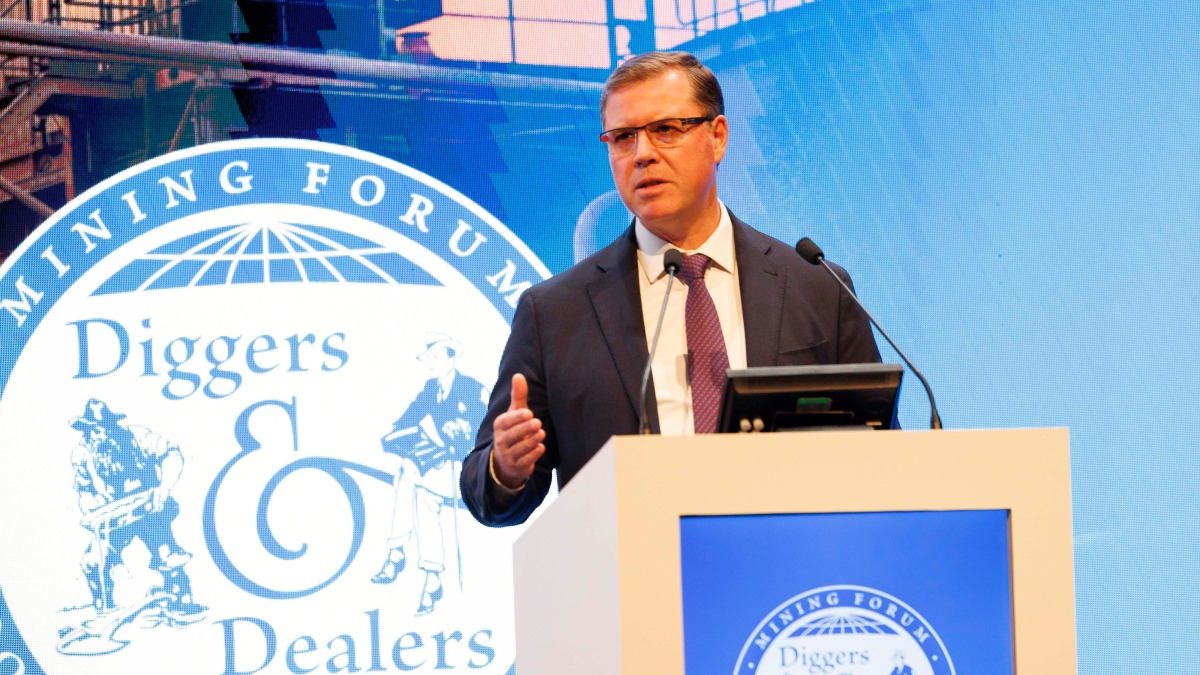Diggers and Dealers: Boss defends uranium sector amid stale yellowcake sentiment

Boss Energy MD Duncan Craib. Pic: Diggers and Dealers
- Most large uranium stocks have been on a dive for months as lull hits yellowcake sentiment
- But Boss Energy MD Duncan Craib says investors shouldn’t lose sight of 2024’s supply deficit
- Craib calls for state govs to embrace uranium sector, echoing opposition leader Peter Dutton
Uranium stocks were among the star performers of 2023, but 2024 has proven tougher as spot prices retraced from 16-year highs of US$107/lb in January back to US$82.25/lb.
Despite term prices rising to long-term highs of ~US$80/lb, an indicator of prices paid by utilities under contracts with miners, most large ASX uranium stocks have been down between 35-50% since late May.
For Boss Energy (ASX:BOE), which recently reopened the Honeymoon uranium mine in South Australia, that slide coincided (and included an initial trading day heavily affected) by a share sale by directors including MD Duncan Craib.
Speaking on the sidelines of the Diggers and Dealers Mining Forum in Kalgoorlie, Craib defended the share sale, saying other uranium companies had suffered negative moves in recent months.
Pessimism hit a boiling point on Friday when Kazakhstan’s Kazatomprom, the world’s biggest producer, announced an extra 1000t of production this year.
But Craib downplayed the production lift, highlighting an aniticipated 78Mlb supply deficit in 2024.
“I don’t think it’s a sort of fall in global uranium (equity) prices that people are pointing to. In terms of world supply,” he said.
“It’s not nearly enough to meet the demand requirements. It’s probably a two to 5% increase in what was expected.
“Don’t lose sight, most of Kazakhstan’s production is going to China and Russia. It’s not coming to the Western markets. Western markets need new Western supply and I think that’s something a lot of the investors miss.”
Nuclear push
Craib’s talk came a day after Federal Opposition Leader Peter Dutton came through Kalgoorlie, pushing a planned rollout of nuclear power to combat the Albanese Labor Government’s emissions reduction strategy.
He also put the heat on state governments to relax restrictions on uranium mining.
“Why would we be doing ourselves out of an export opportunity, or why would we be stopping ourselves from earning additional income for our country, creating extra jobs?” Dutton said.
“We can do that through opening up uranium exports, we can help take WA to the next level… I just don’t understand the government’s reluctance here. It’s ideologically based and we’re going to do ourselves out of thousands of jobs.”
Craib stopped short of calling on the federal government to step in, but said we were bypassing opportunities to supply into a market being accessed by other western economies to produce low carbon energy.
“Ultimately, I think in mining the states have a big say in what needs to happen,” he said.
“I don’t know. I guess the bottom line is Australia’s got a third of the world’s resources of uranium, a huge opportunity.
“And as we’re weaning ourselves off fossil fuels here, here’s a wonderful sort of industry to migrate to.
“Whether it’s federal government involvement, or at least state governments to stand up.”
Walking away
Speaking of restrictions on uranium mining, Boss was involved in a controversial attempt by minority owners of the Rio Tinto backed Energy Resources of Australia (ASX:ERA) to develop the Jabiluka uranium mine, after being unmasked as a potential bidder in a $550m deal to take the deposit out of ERA’s hands.
It would have seen minority investors such as vocal ERA shareholder Willy Packer given Boss shares and a 10% free-carried ownership trust for traditional owners.
The rub here is the deposit has, for over 40 years, been opposed by the Mirarr people.
Tasked now with a more than $2bn rehab bill for the spent Ranger uranium mine in the Kakadu National Park, Rio Tinto and ERA had promised not to develop the deposit as long as they held the lease.
That’s irrelevant now, since the NT government, supported by Canberra, decided not to renew the lease, with the land where the deposit is based now reserved to prevent new mining applications.
There is a glimmer that the lease could be renewed, saying the Albanese Government’s advice to. not have the lease renewed denied it natural justice and taking action in the Federal Court against the Federal resources minister and Government, NT mines minister and Government, and the Jabiluka Aboriginal Lands Trust.
Craib downplayed the offer, saying it was an opportunistic proposal following an approach from minority ERA shareholders.
“They approached Boss Energy and myself saying ‘you’re a credible producer, you’re up and running, would you consider assisting with this process and seeing Jabiluka into production?'” Craib said.
“We considered the proposal, but made it highly conditional. It was conditional upon the Mirarr people looking at our financial terms that we were offering, which were quite lucrative.
“It was conditional upon state government and federal government and the board and shareholders of ERA.
“It was very preliminary, I never spoke to the Mirarr people. As soon as we were going to speak with the Northern Land Council, really within days Albanese advised the Northern Territory government not to pursue it.”
But Craib denied the push from minority shareholders to sell Jabiluka was evidence the mining industry was disrespectful of the rights of First Nations groups.
“This was highly conditional (based on) whether they themselves wanted the project to go forward and when you look at Honeymoon with our own native title groups, we’ve got three – Adnyamathanha, Wilyakali and the Ngadjuri Nation – all working together. We’ve got a joint native title agreement,” Craib said.
“We’ve got over 8% Aboriginal traditional owners working on our project. So we’re very, very respectful. Nothing was going to go ahead unless there was buy-in from all parties. So it means (traditional owner support is) absolutely sacrosanct.”
He believes incidents like Rio Tinto’s Juukan Gorge destruction in the Pilbara, which brought a reckoning for mining’s interaction with Aboriginal people in 2020, are not reflective of the wider industry.
“What happened with Juukan Gorge and what happened with Rio Tinto’s involvement in that, it’s not how the rest of the mining community operates. That was a mistake and I think Rio Tinto has been apologetic for it for some time,” he said.
“I wouldn’t broad brush that across the whole mining industry.
“You can’t sell a project without that native title buy-in and a collegiate approach.”
Boss’ Honeymoon has loaded its first ship ahead of exports out of South Australia, with the mine to ramp up over the next couple years to 2.45Mlbpa.
In Oz, only BHP’s (ASX:BHP) Olympic Dam, primarily a copper mine but also one of the world’s top uranium producers as a by-product, and the US-owned Beverley uranium mine currently export yellowcake, both out of SA.
Related Topics

UNLOCK INSIGHTS
Discover the untold stories of emerging ASX stocks.
Daily news and expert analysis, it's free to subscribe.
By proceeding, you confirm you understand that we handle personal information in accordance with our Privacy Policy.








